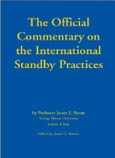The Official Commentary on The International Standby Practices is the authoritative rule-by-rule analysis of ISP98, authored by the drafters.
A must for those who work with standby letters of credit on a regular basis, The Official Commentary of The International Standby Practices is the first source that bankers, lawyers, corporates, consultants, academics, and other LC professionals turn to for guidance and explanation regarding ISP98.
Written by Professor James E. BYRNE and edited by James G. BARNES, each of the 89 rules of ISP98 is analyzed in depth, including context and implications. Back in print and available for the first time since 2005, The Official Commentary on The International Standby Practices delivers clear, concise explanations that are readily understood and immensely useful.
What is Included
Analysis of each ISP98 rule, containing:
- Statement of its origin and place in standby practice
- Analysis of the issues addressed by the Rule
- Cross references
- List of applicable ISP provisions
- Reference to other sources such as the UCP, URDG, UCC Article 5 & UN Convention
Who Should Read this
- Bankers who use standbys and demand guarantees
- Lawyers dealing with standbys and demand guarantees
- Corporates working with standby letters of credit or guarantees
- Professionals needed guidance regarding ISP98
Table of Contents
Preface-Dieter Kiefer
Preface-Dan Taylor
Preface-Gary Collyer
Foreword-James G. Barnes
Introduction








